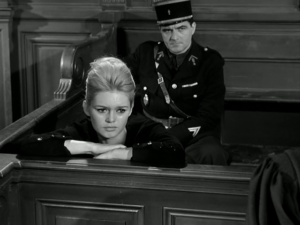STUDIO: Criterion | DIRECTOR: Henri-Georges Clouzot | CAST: Brigitte Bardot, Paul Meurisse, Charles Vanel, Sami Frey, Marie-José Nat, Jean-Loup Reynold
RELEASE DATE: 2/12/19 | PRICE: DVD $21.86, Blu-ray $27.97
BONUSES: interview with H-G Clouzot, 1982 interview with Brigitte Bardot, documentary “Le Scandale Clouzot” by Pierre-Henri Gibert
SPECS: NR | 128 min. | Foreign language drama | 1.66:1 fullscreen | mono | French with English subtitles
Brigitte Bardot could act? The classic 1960 courtroom drama La Vérité shows that the hottest sex bomb of the Fifties could indeed sink into a role and deliver a surprisingly good performance. If, that is, her director was a renowned tyrant like Henri-Georges Clouzot (The Wages of Fear) and she could identify with her character by undergoing inner torment, to the extent of a nervous breakdown and a suicide attempt.
La Vérité is a curious creation by the great Clouzot, who is best known for his thrillers (Le Corbeau, Diabolique). The crime that Bardot’s character is on trial for — the murder of a lover (Sami Frey, Band of Outsiders) who tossed her aside — is compelling, but the trial framework which takes up a good amount of the film’s running time contains many clichés and contrivances. These include lawyers arguing in front of the judge, more than one witness giving testimony at the same time, and the defendant and a witness yelling at each other for quite a long time while the trial in session.
This melodramatic impulse was the result of Clouzot’s collaboration on the screenplay with five scripters. The murder plotline, recounted in flashback during the trial, occurs in a fascinating milieu (the bohemian Latin Quarter of Paris) and also features Bardot in her familiar sex-kitten persona, but here she is a sexpot who is blasé about most men but madly in love with the man she stole away from her sister (and who is stolen back by her sister — another melodramatic conceit that seems absurd).
 The defense Bardot’s character clings to is that she wasn’t intending to murder her lover but instead wanted to commit suicide in front of him. Her character thus melts down slowly in the flashbacks and instantly in the courtroom sequences. In these moments Bardot is quite sympathetic as a victim. (Her seductress roles in other films placed her in the role of the aggressor.)
The defense Bardot’s character clings to is that she wasn’t intending to murder her lover but instead wanted to commit suicide in front of him. Her character thus melts down slowly in the flashbacks and instantly in the courtroom sequences. In these moments Bardot is quite sympathetic as a victim. (Her seductress roles in other films placed her in the role of the aggressor.)
The courtroom sequences are indeed familiar in tone, but Clouzot added one aspect that saves these scenes from being unintentional camp. He cast two of the actors he had gotten excellent performances from in the past: Paul Meurisse (the husband in Diabolique) and Charles Vanel (Yves Montand’s sidekick in Wages of Fear). Thus, the courtroom scenes contain an acting “battle” that can distract the viewer from the cornier twists in the plotline.
The supplements contained in the package illuminate the behind-the-scenes drama that led to Bardot’s very convincing onscreen meltdown. The first bonus is a TV chat with Clouzot, who explains that the film was fully scripted with Sophia Loren cast in the lead, but producer Raoul Levy demanded that Bardot had to star, and Clouzot ordered the finished script to be completely rewritten to accommodate the change. When quizzed about Bardot’s competence as a performer, Clouzot defends her gallantly by declaring that “she’s a true actress.”
A 1982 interview with Bardot reveals much more of the story, as BB calls Clouzot “diabolical” and “demonic” in his behavior, but also “amazingly talented.” She confirms the much-circulated story that Clouzot slapped her in the face (something he did on a regular basis with his performers). Her response (unlike those other performers) was to slap him back.
The rest of the interview segment is even more revelatory (and harrowing). She discuses the media frenzy that followed her everywhere, and the fact that an affair she had with costar Sami Frey during filming ruined her marriage. She’s uncommonly honest about how she attempted suicide and later was fine with allowing her husband to have custody of their young son because Brigitte felt unable to care for herself, never mind a child.
The hour-long 2017 documentary “Le Scandale Clouzot” by Pierre-Henri Gibert completes the package. Here we learn that an illness he suffered as a youth gave him a lifelong fear of death, which he confronted in his thrillers. It is also noted that, despite his frequent fits of anger at his crew and performers, he continually needed to be surrounded by big groups of people to function artistically.
His films are given high praise by a variety of talking heads, including filmmakers and Clouzot fans Bertrand Blier (Going Places) and Bong Joon-Ho (The Host). Even Clouzot’s closest friends and associates describe him, though, as a “megalomaniac” for whom “sadomasochism ruled his relationships” (one collaborator says he was never happier than when “seeking out flaws” in his cast and crew).
The Bardot stories are repeated in the doc, but even nastier are the details of his treatment of his wife Vera, whom he dominated in emotional and psychological ways, as when he cast her — a woman with a feeble heart — as the character who is frightened to death in Diabolique.
The documentary eloquently defends Clouzot from charges of wartime collaboration. It in fact shows how his film Le Corbeau exposed the underside of occupied France. Throughout, one gets the impression that he was one of the most unique and talented French filmmakers of all time, but it is clear that it was far better to watch his movies than to work on them.
|
Buy or Rent La Vérité
|
|---|
Leave a Reply